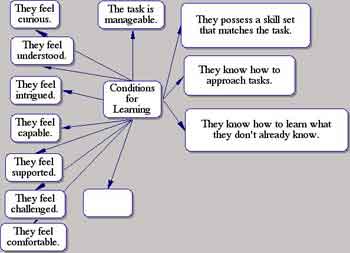أنشئ حسابًا أو سجّل الدخول للانضمام إلى مجتمعك المهني.

Quality teaching is one aspect of a larger system, since there is a dynamic and complicated interplay between the social aspects of learning and the specific classroom experiences offered.
Some students enter school ready to learn most days. Others arrive distracted, hungry and unsettled. An effective teacher does whatever possible to create conditions that engage the full spectrum of students, but it is not always possible to counter the negative currents and influences contributed by a harsh or disturbing external culture.
Young ones are most likely to learn when . . .

The list in the diagram above leaves out some critically important conditions that teachers are quick to add in an audience situation:
Sadly, few policy makers on the national level seem willing to address these broader conditions when seeking improvement in schools. In countries where "quality teaching" is a current fashion, the teacher's work is portrayed as if one works within a vacuum free of these influences. Researchers seek the right packages, the right programs and the right teaching strategies to make impressive shifts in student performance, but that research is tragically flawed by its narrow focus on classroom interactions.
Looking for some kind of high pay-off and reliable approach, policy makers often commission what are called "best evidence syntheses" of research - trusting to the so-called science of teaching to inform policy.
Unfortunately, much of the policy that might emerge from such collections and efforts is flawed, in part because the collections are weak on science and tend to compound the imperfections of the thousands of original studies upon which they are based.



